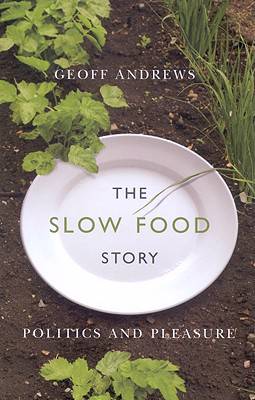
Door een staking bij bpost kan je online bestelling op dit moment iets langer onderweg zijn dan voorzien. Dringend iets nodig? Onze winkels ontvangen jou met open armen!
- Afhalen na 1 uur in een winkel met voorraad
- Gratis thuislevering in België vanaf € 30
- Ruim aanbod met 7 miljoen producten
Door een staking bij bpost kan je online bestelling op dit moment iets langer onderweg zijn dan voorzien. Dringend iets nodig? Onze winkels ontvangen jou met open armen!
- Afhalen na 1 uur in een winkel met voorraad
- Gratis thuislevering in België vanaf € 30
- Ruim aanbod met 7 miljoen producten
Zoeken
€ 27,95
+ 55 punten
Uitvoering
Omschrijving
The Slow Food movement was established in Italy as a response to the dominance of fast food chains, supermarkets, and large-scale agribusiness. Defending "the universal right to pleasure," it promotes food production and consumption based on "good, clean, and fair" local products. In twenty years Slow Food has grown into an international organisation with more than 80,000 members in over 100 countries. With roots in the 1960s and 1970s counter-culture, Slow Food's distinctive politics link gastronomic pleasure and environmental responsibility. The movement crosses the left-right divide to embrace both the conservative desire to preserve traditional rural communities and an alternative "virtuous" idea of globalisation. In the first in-depth study of the fascinating politics of Slow Food, Geoff Andrews shows that the alternative future it offers can be extended to all aspects of modern life. The Slow Food Story is an extensive critique of the fast-moving, work-obsessed contemporary capitalist culture.
Specificaties
Betrokkenen
- Auteur(s):
- Uitgeverij:
Inhoud
- Aantal bladzijden:
- 216
- Taal:
- Engels
Eigenschappen
- Productcode (EAN):
- 9780773534780
- Verschijningsdatum:
- 7/07/2008
- Uitvoering:
- Paperback
- Formaat:
- Trade paperback (VS)
- Afmetingen:
- 139 mm x 207 mm
- Gewicht:
- 249 g

Alleen bij Standaard Boekhandel
+ 55 punten op je klantenkaart van Standaard Boekhandel
Beoordelingen
We publiceren alleen reviews die voldoen aan de voorwaarden voor reviews. Bekijk onze voorwaarden voor reviews.











